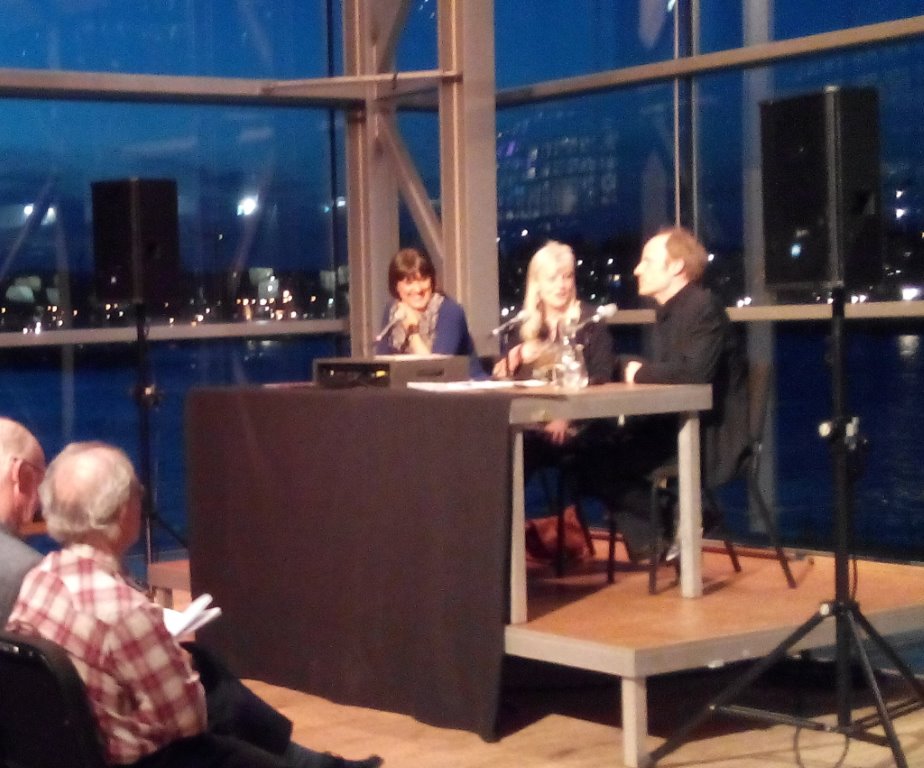Reinbert de Leeuw conducted an electrifying concert around Leoš Janáček at the Muziekgebouw aan het IJ on Thursday 12 March. The synergy between instrumentalists, singers and conductor yielded flawless performances, which were rewarded with ovational applause by the almost sold-out audience both before and after the interval. The cheering even led to an encore: a song from the popular cycle Rikadla (nursery rhymes). Old times seemed to be revived, although this time it was not the Schönberg Ensemble and the Nederlands Kamerkoor on stage, but the Flemish ensembles Het Collectief and Collegium Vocale Gent.
The concert in the Thursday Evening Series was already performed last summer at the Festival de Saintes in France. It was De Leeuw's first collaboration with Collegium Vocale Gent, which is broadening its horizons far beyond early music. De Leeuw had worked with Het Collectief twice before. In 2011, Schoenberg's Pierrot lunaire on the lecterns and two years later followed by works by Berg, Busoni, Webern and Zemlinsky, recently released on CD.
Without exception, these are De Leeuw's masterpieces, with which he made his mark on Dutch musical life from the 1960s and 1970s onwards. Janáček is also an old love and almost all the works performed yesterday were previously recorded with the Schönberg Ensemble and the Nederlands Kamerkoor; relatively new is his 2007 instrumentation of Janáček's Piano Sonata 1.X.1905. This concert programme will also appear on CD. It seems as if De Leeuw, at 76e revisiting his career, but with Flemish ensembles.
It is nice to note that Belgium provided the springboard for Janáček's international career in 1905, when a Czech choir Ah, the war presented at Spa. This piece for male choir a cappella was missing last night, though the wistful Our birch and the wrangling nationalist Kantor Halftar. In it, a village cantor dares to speak Czech instead of German to the district inspector, which he pays for with death. The fierce, scanned exclamations were passionately performed by the men of Collegium Vocale Gent.
Compelling was also The trail of the wolf, a mini cantata for piano, women's choir and solo soprano (a beautifully singing Elisabeth Rapp). A hunter encounters a 'wolf' in his much younger wife's bed and shoots the adulterer dead. In this colourful, varied work, the singers effortlessly switched between the many sudden changes of mood, subtly assisted by pianist Thomas Dieltjens. [Tweet "In Janácek's Spoor van de wolf, the ladies of Collegium Vocale Gent switch effortlessly between the different moods"].
Poignant was Elegy on the death of my daughter Olga, in which Janáček shapes his grief into poignant harmonies and a stirring lament by a solo tenor (Paul Bentley-Angell). Through this, he weaves impressionistic piano strings and consolatory chants, expressing love for his daughter and eventual resignation to loss. The sacred atmosphere was enhanced by the fact that there was no applause between the choral works.
The concert opened with the wonderful Concertino for piano, two violins, viola, clarinet, horn and bassoon, in which there is initially hardly any interaction between piano and ensemble. In the first movement, a recurring, repeatedly breaking motif from the piano is coloured in with sparse notes from the horn. Thus Janáček depicts "how a hedgehog just can't reach its hole", as Dieltjens told me during the introduction. In movement two, the clarinet acts as a bouncy squirrel and only from the third movement onwards do the other musicians get involved. And how! Undirected, Dieltjens and his companions spatulously played their eruptive parts, the fire bursting forth.

Emilie de Voght, Thea Derks & Thomas Dieltjens during introduction MGIJ 12-3-2015
[Tweet "Undirected, Dieltjens and his companions splashily played their eruptive parts in Janácek's Concertino"].
After the break, the catchy cycle sounded Rikadla and De Leeuw's arrangement of the Sonata 1.X.1905. Janáček composed this piano piece out of anger when police stabbed a worker to death during a demonstration in front of a Czech university in Brno. In my biography Reinbert de Leeuw, man or melody De Leeuw argues that in just about everything, this sonata 'actually exceeds the possibilities of the piano'. An opinion Dieltjens could only 'partly' agree with. According to him, however, the piece does lend itself perfectly to instrumentation, since the piano 'can only languish moderately'.
In his arrangement, De Leeuw gives an almost concertante role to the accordion, an instrument that seems to have been made for this very purpose. The horn, a typical Romantic instrument, also plays an important role; he omits the piano. Its capricious part is cleverly transposed to strings and wind instruments, although it has lost some of its pungency during the translation. De Leeuw also turned on the passionate revels too emphatically at times during the concert, pushing the boundary with bombast dangerously close.
The beautifully put together programme ended with Rikadla, a tailpiece of nineteen short songs set to absurdist nursery rhymes. In this, Janáček draws on Moravian folk music; I regularly found myself in a village inn. All the more so as ensemble and choir conveyed the piece with apparent pleasure despite the tricky Czech language and breakneck tempi. In the final song, the clarinettist plays dizzyingly virtuoso antics, switching between A and B flat clarinet like a magician at lightning speed. Julien Hervé received an open curtain for his flawless performance. Rightly so, this song was repeated as an encore.
Reinbert de Leeuw may 'conduct as if he were soaking the laundry', as Cootje van Baaren notes in my biography, but his unconditional commitment often manages to make performers rise above themselves. I would have liked to shake his hand afterwards, but unfortunately he was not open to it (yet).
